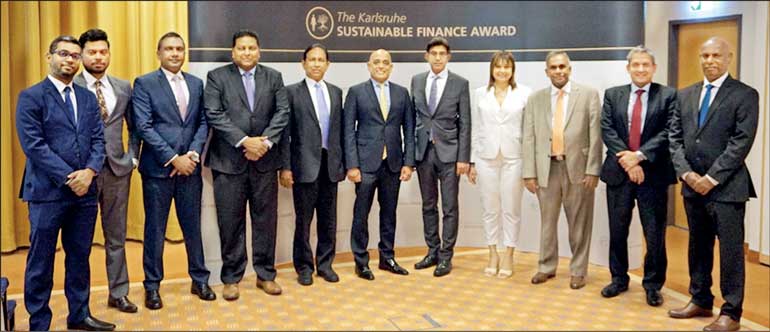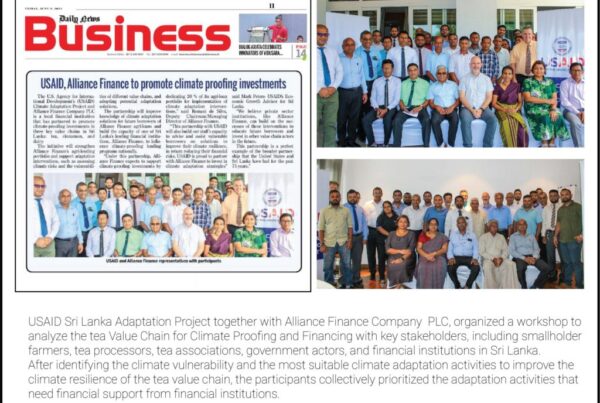
The Global Sustainable Finance Conference (GSFC) 2023, which took place in Germany from 6 to 7 July 2023, marked a significant milestone in Sri Lanka’s journey towards establishing a new and sustainable economy. The conference brought together esteemed institutions from Sri Lanka, specifically representing the banking sector with Hatton National Bank (HNB) PLC and SANASA Development Bank, as well as non-banking financial institutions including Alliance Finance Company PLC, People’s Leasing & Finance (PLC), Siyapatha Finance PLC, and Sarvodaya Development Finance (SDF) PLC.
The Global Sustainable Finance Conference (GSFC) 2023 was a timely event for Sri Lank as the country seeks to rebuild its economy sustainably following the recent economic crisis. Undoubtedly, the role of the financial sector is critical for a successful economic turnaround.
The conference provided an opportunity for the Sri Lankan delegation to get deep insights into the world‘s most comprehensive sustainability framework, the Sustainability Standards and Certification Initiative (SSCI) for Value-Driven Financial Institutions, which equips certified institutions to profitably drive the creation of a new sustainable economy that Sri Lanka urgently needs.
While networking with the Global Sustainable Finance Community at the conference, the Sri Lankan delegation also benefited from the experiences of their peers from other developing regions of the world who have adopted the Sustainability Standards launched by the European Organisation for Sustainable Development (EOSD).
The Sri Lanka delegation, now formed as a Core Group to spearhead SSCI in the country, is inspired by the holistic approach to Sustainable Banking and Finance unveiled during the conference in Germany and is committed to playing a pivotal role in facilitating a green and socially sustainable recovery for Sri Lanka. Additionally, the EOSD Financing 4.0, could further benefit Sri Lanka by providing the platform for cutting-edge technical expertise and mobilisation and deployment of financial resources to support the sustainable economic transformation. Such a transformation will create employment opportunities, stimulate economic growth, and enhance the country’s resilience in the face of future challenges while achieving the desired milestones in CBSL’s Roadmap for Sustainable Finance in Sri Lanka.
The participants from Sri Lanka witnessed how potential synergies between CBSL’s Roadmap for Sustainable Finance, National Development Agenda goals and UN SDGs could be used to unlock new business opportunities for the Banking and Non-Banking sector using the SSCI framework.
The Sustainable Finance Road Map aims to foster policy cohesiveness across ministries, the Central Bank, other policymakers and financial sector participants. Its goal is to address specific environmental, social, and governance (ESG) issues and enhance the resilience of financial institutions. By promoting effective ESG risk management, the road map seeks to enable sustainable growth and development while mobilising private capital for sustainable investments. Ultimately, it aims to provide the necessary financial resources for Sri Lanka to achieve its Sustainable Development Goals (SDGs).
By adopting the holistic Sustainability Standards discussed during the conference in Germany, the financial institutions will not only operationalise the Sustainable Finance Road Map, but become partners of the Central Bank in addressing the burning issues of inflation, especially supply-side inflation, unemployment, and exchange rate and financial sector stability. Sustainably addressing these issues are some of the core aims of the SSCI and as a result, it delivers a practical tool to achieve them. The Sri Lankan Core Group has the resolve to deliver towards this end and is preparing itself to work with all the relevant stakeholders to ensure a fast and successful green recovery of the Sri Lankan economy.
Rebuilding the Micro, Small, and Medium Enterprises (MSME) sector is of utmost importance due to its significant contribution to the Gross Domestic Product (GDP). Accounting for 68% of the GDP, the MSME sector plays a crucial role in fostering economic growth, job creation, and innovation. However, the sector has faced numerous challenges, including the global pandemic, economic downturns, and insufficient financial support. To this end, the SSCI equips the financial institutions to deliver green and sustainable financial and non-financial services to revitalise the MSME sector for social and economic development and environmental protection.
At this year’s conference, financial organisations from partner countries such as India, the Philippines, Bangladesh, Turkey, Uganda, Zimbabwe, and Sri Lanka came together sharing a common commitment to create sustainable economies. The conference fostered collaboration and knowledge exchange, enabling participants to implement sustainable practices and drive positive change in their regions. Its primary objective was to disseminate knowledge about the Sustainability Standards and Certification Initiative (SSCI) among the delegates.
Developed by the EOSD in Germany, the SSCI is the first measurable and certifiable sustainability standard targeting value-driven financial institutions. Attaining SSCI certification equips institutions with the necessary tools and guidelines to become industry leaders, fostering sustainable economies within their respective countries and territories.
The delegates from Sri Lanka who attended GSFC 2023 showcased the passion and dedication of the country’s financial institutions towards sustainable development. Through active participation and insightful contributions, they laid a solid foundation for revitalising the financial ecosystem. These institutions aim to make Sri Lanka greener, fairer, and technologically advanced by aligning their strategies with sustainable practices.
Led by Alliance Finance Company (AFC) and People’s Leasing Company (PLC), the Sri Lankan delegation at the Global Sustainable Finance Conference consisted of representatives from the banking and financial sectors. AFC is already certified under the Sustainability Standards and Certification Initiative (SSCI) and PLC recently enrolled for the certification program. Accompanied by other prominent players in the Banking and finance sector, the delegation expressed their commitment to fostering socio-economic growth in Sri Lanka through initiatives that prioritise social and environmental well-being. Their collective passion for sustainable development underscores their dedication to building a socially conscious and environmentally responsible economy.
As the Core Group driving the implementation of the SSCI in Sri Lanka, these delegates hold a leadership role crucial in realising the country’s vision of a high-income economy built on sustainable financial practices. Their actions in embracing sustainability standards and certifications will not only enhance their profitability but also inspire other financial institutions in the country to follow suit. This transformative impact will pave the way for a brighter and more prosperous future for Sri Lanka, benefiting both present and future generations.





